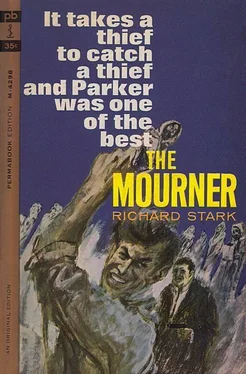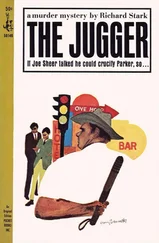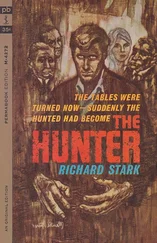Grand total: One hundred and one thousand, three hundred and thirty-three dollars!
He sang gaily in the shower. In English.
He was awakened the next afternoon on the beach by a funereal man in black who asked if he was Mr. John Auguste.
He opened his eyes, but immediately closed them again, against the glare of the sun. He had seen only the funereal man in black, in silhouette, bending over him, blotting out part of the sky.
Mr. John Auguste? Some mistake. I am Auguste Menlo. The similarity of—
No!
He sat bolt upright, not sure for a second whether he’d actually said the words aloud or merely thought them. But the funereal man in black was still standing there, bowed, patient, waiting for an answer. With the riot of colors on the beach, he looked like someone’s odd idea of a joke.
Menlo said, “Yes, I am John Auguste.”
“You are wanted on the house phone, sir. By the blue entrance, phone number three.”
“Thank you.”
The funereal man in black went away. He was wearing highly shined black oxfords, which sank into the sand at every step. He walked slowly and cautiously because of this, and looked like the Angel of Death. Menlo got up from the pneumatic mattress and followed him.
It was Monday afternoon, a little before three, and the hotel beach was jammed. All of yesterday’s check-ins were already there, plus the layovers from the week before. Menlo had to cut a meandering path through them to get to the phone.
He was wearing maroon boxer-style bathing trunks. He looked ridiculous, and knew it, but he also realized he looked no more ridiculous than half the other men on the beach. His flesh had reddened from exposure to the sun, and it was just as well he’d been awakened. A little longer, and he would have had a painful burn. Tomorrow he would have to get some of that suntan lotion he smelled everywhere on the beach.
Already he was beginning to feel at home. Sunshine and warmth. A pneumatic mattress to lie on, and occasional beautiful girls in skimpy white bathing suits to ogle. Plus, of course, the one beautiful girl to go to bed with. After last night with Bett Harrow, this day of sleep and warmth and contentment was more than a luxury; it was a necessity. There was a twenty-year difference between them, and by approximately one o’clock that morning it had begun to show.
He smiled to himself, plodding through the sand toward the hotel. What a way to exercise the weight away, eh? Sweat it away by day beneath the hot sun, sweat it away by night beneath the cool sheets.
To the left of the blue entrance were the telephones, a row of five mounted on the wall, with soundproof barriers between them, sticking out like blinkers on a horse. Menlo went to number three and picked up the receiver. “Auguste here.”
“This is Ralph Harrow.”
“Ah! Mr. Harrow!”
“I’m told you have something to show me. If it’s convenient, you could bring it up now. Top floor, suite D.”
Bring it? Not quite so soon, Menlo thought. “Ah, I am sorry. It isn’t, ah, completely ready to be shown; not quite yet. But perhaps I could come and discuss the situation with you? In one hour?”
There was the briefest of pauses, and then Harrow replied, “That’s fine. One hour.”
“I look forward to meeting you,” Menlo said, but Harrow had hung up. Menlo returned the receiver to its hook and smiled at it. Bring the statue? Did Harrow have some idea he could get the statue by trickery, and not pay for it?
A depressing thought occurred to him. That might be why the daughter had been so free with her charms. To lull his suspicions, to dull his wits.
But would a father, even in the United States, use his daughter in such fashion?
He wished he knew for sure what Bett Harrow saw in him. He was not young or handsome, he was only rich. But she was rich too.
He couldn’t understand it. He was grateful for it and he would not refuse it, but he couldn’t understand it.
He left the telephones and went through the blue entrance — a slate walk flanked by cool green ponds full of tiny fish and screened on both sides by tall board fences painted blue — and entered the rear of the hotel. There was a bank of three elevators here, for the convenience of the swimmers and sunbathers. Menlo rode up to the seventh floor, and then walked the endless corridors to his room.
His black suit had been returned, beautifully cleaned and pressed. His freshly laundered shirts had come back, and the new socks and underwear he had bought in the hotel shop that morning along with the maroon bathing trunks were put away in the dresser drawer. He took a shower and dressed, checked the locked suitcase full of money in the closet, which had not been tampered with, and left the room. He went to the nearer bank of elevators, and when the elevator arrived, said, “Top floor.”
“Yes, sir.”
When he got off, he asked directions to suite D, and was told to bear to his right. He did so. The halls up here were done in pastel shades, much less violent than in the plebeian quarters below, much more restful. He walked a considerable distance before finally seeing a door of any kind, which was marked “C.” After a turning he came to suite D.
A middle-aged gentleman who could have been nothing but an American businessman — or perhaps a Swiss businessman, or a Scandinavian businessman, but at any rate a capitalist businessman — opened the door to Menlo’s knock. “Mr. Menlo?”
“The name is Auguste, for the moment. John Auguste. You are Ralph Harrow?”
“Yes. Come in.”
The daughter, down on the twelfth floor, had a two-room suite. How many rooms this one contained was anyone’s guess. Harrow led the way down the foyer into a large sitting room. Directly ahead, through French doors, was a terrace. Doors in both side walls were open, leading into other parts of the suite.
“Sit down,” said Harrow. “Drink?”
“Perhaps, Scotch. And plain water.”
“Right you are.”
The long sofa in the middle of the room was white leather. The marble-topped coffee table in front of it was covered by a number of American magazines, tastefully laid out in a diagonal row, so that the name of each magazine showed. Menlo sat down on the sofa, feeling the whoosh of air leaving the cushion, and looked around. He would have to get a suite like this for himself soon. Once everything had been straightened out.
Harrow brought his Scotch and water, along with a drink for himself in his other hand. He sat down at the opposite end of the sofa. “My daughter tells me you took the statue away from Willis.”
“In a manner of speaking.” Menlo smiled. “Actually he never did have possession of it.”
“Then you’re an amazing man. Willis didn’t strike me as the kind of man you could take things from. Well. But that’s not why you’re here. You realize I paid for the statue once, don’t you?”
“So I understand.”
“Fifty thousand. Willis must have had that on him too. You mean to say you didn’t get it?”
“No, I did not. An oversight, possibly.”
“Bett tells me you have money. Quite a bit of it. In cash.”
“From another source entirely, I assure you.”
Harrow waved that aside. “The point is, I’ve already paid for the damn thing. I don’t like the idea of paying twice.”
“Your daughter didn’t explain my terms?”
“No, she didn’t.”
Menlo outlined them quickly; a safe place for his money, the necessary papers to explain himself should it ever become necessary. “And one last thing,” he said. “One of my teeth is capped, and within the cap is a tiny capsule containing poison. I don’t believe—”
“Poison!”
Читать дальше












